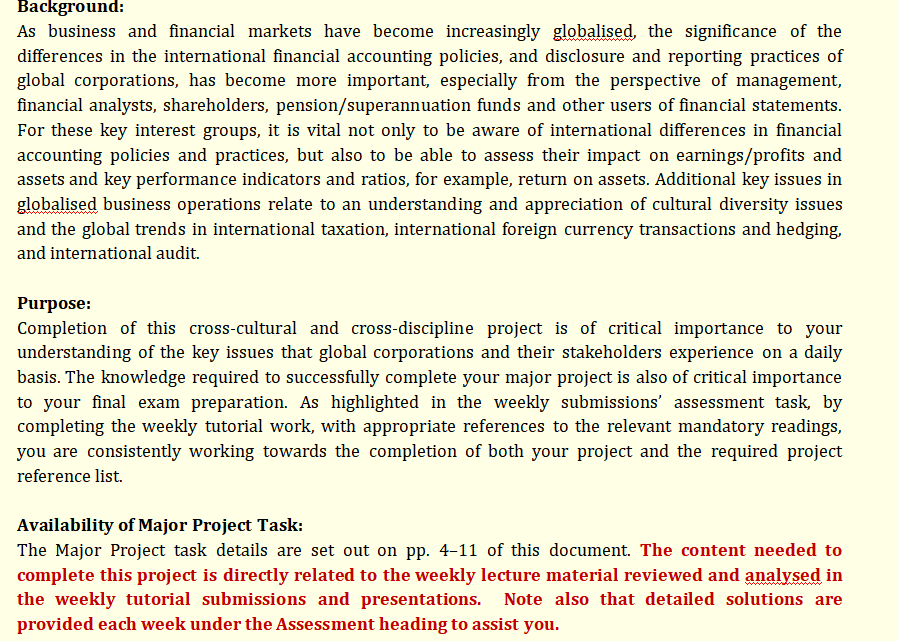Question
A: Preliminary Explanations for the Selection of the Three Nations Across Cultural Groupings and the ONE Industry 1)In your introduction: (a)provide a summary explanation of
 A: Preliminary Explanations for the Selection of the Three Nations Across Cultural Groupings and the ONE Industry 1)In your introduction: (a)provide a summary explanation of why you have selected each of the three nations (one from each of the three different cultural groupings Anglo-Saxon, Germanic Latin and Asian) - Note: in your summary explanation explain WHY it is important to your clients for all three nations you select to have adopted IFRS. [45 Marks 15 Marks for Each of the Three Nations]
A: Preliminary Explanations for the Selection of the Three Nations Across Cultural Groupings and the ONE Industry 1)In your introduction: (a)provide a summary explanation of why you have selected each of the three nations (one from each of the three different cultural groupings Anglo-Saxon, Germanic Latin and Asian) - Note: in your summary explanation explain WHY it is important to your clients for all three nations you select to have adopted IFRS. [45 Marks 15 Marks for Each of the Three Nations]
In selecting your nations using the AT Kearney Report 2020 as highlighted on p. 9 of these task requirements, also consider whether there are issues of corruption or serious environmental impacts or economic issues which need to be considered. For example, will these issues impact negatively (or positively if there is a lack/absence of corruption and environmental issues etc.) on any potential investment in each of the nations you have selected? [contd] For example, consider economic issues such as Post-BREXIT impacts on Britain and its impacts on FDI into the UK generally. You need to also consider major environmental and corruption issues which may be occurring in nations. For example, there are extreme pollution issues in Canada and China and you also need to consider any current information available on the impact on your nations related to the release of the FINCen files by the ICIJ as detailed in lectures.
(b) provide a preliminary and summary explanation of why you have selected the industry for investment in all three of these nations. That is, only ONE industry must be selected from the three industries identified by your clients. Example expert reports will be provided on Discussion Board under the Major Individual Project Forum. These, independent, expert reports need to be used to support selection of your industry for investment for your clients. In addition, also discuss any FinCen-related impacts on the industry you selected as it is operating within each of your three nations. [15 Marks]
B: Comparative Analysis of Three Nations PRE-IFRS Development Factors, Cultural Dimensions and Accounting Values and Their Impact on POST-IFRS Accounting Values and Financial Information Quality and Foreign Direct Investment Risk (FDIR) In entering into this new investment project, the CBA Board of Directors are aware that the IFRS major global convergence project has been developed since the major Economic Crisis in 1987, and are interested in understanding, firstly, what financial reporting factors/issues contributed to this event. They are also interested in obtaining your advice as to whether the IFRS project has been successful in lowering foreign direct investment risk globally. In order to provide the relevant information to the Directors in terms of each of the three nations you have selected you are required to: 2)Provide a comparative analysis of the key (most important) PRE-IFRS development factors of each of the three nations selected; [10 Marks]
3)Provide a comparative analysis of the PRE-IFRS cultural dimensions identified for each nation within the Hofstede model and discuss how the PRE-IFRS development factors outlined in Question Two above have impacted on these dimensions NOTE: Do NOT use the Hofstede site/scores in this analysis refer to class discussions; [10 Marks]
4)Provide a comparative analysis of the PRE-IFRS accounting values that are then associated with each of these country-based sets of cultural dimensions as established within the Gray model and discuss how the PRE-IFRS development factors and the cultural dimensions discussed in Questions Two and Three have impacted on these accounting values; and [10 Marks] [contd]
5)Summarise the major changes in the financial reporting/accounting processes in each of the three nations you have analysed in the POST-IFRS era. In your answer, identify the date each nation adopted the IFRS framework and provide a summary comparison table of the key accounting values in each nation in a PRE and POST-IFRS comparison. In your view, has the quality of the financial information provided by each nations global corporations improved in the POST-IFRS era? Has the FDI risk for investors been reduced? Why or Why Not? [10 Marks]
Background: As business and financial markets have become increasingly globalised, the significance of the differences in the international financial accounting policies, and disclosure and reporting practices of global corporations, has become more important, especially from the perspective of management, financial analysts, shareholders, pension/superannuation funds and other users of financial statements. For these key interest groups, it is vital not only to be aware of international differences in financial accounting policies and practices, but also to be able to assess their impact on earnings/profits and assets and key performance indicators and ratios, for example, return on assets. Additional key issues in globalised business operations relate to an understanding and appreciation of cultural diversity issues and the global trends in international taxation, international foreign currency transactions and hedging, and international audit. Purpose: Completion of this cross-cultural and cross-discipline project is of critical importance to your understanding of the key issues that global corporations and their stakeholders experience on a daily basis. The knowledge required to successfully complete your major project is also of critical importance to your final exam preparation. As highlighted in the weekly submissions' assessment task, by completing the weekly tutorial work, with appropriate references to the relevant mandatory readings, you are consistently working towards the completion of both your project and the required project reference list. Availability of Major Project Task: The Major Project task details are set out on pp. 4-11 of this document. The content needed to complete this project is directly related to the weekly lecture material reviewed and analysed in the weekly tutorial submissions and presentations. Note also that detailed solutions are provided each week under the Assessment heading to assist you. Background: As business and financial markets have become increasingly globalised, the significance of the differences in the international financial accounting policies, and disclosure and reporting practices of global corporations, has become more important, especially from the perspective of management, financial analysts, shareholders, pension/superannuation funds and other users of financial statements. For these key interest groups, it is vital not only to be aware of international differences in financial accounting policies and practices, but also to be able to assess their impact on earnings/profits and assets and key performance indicators and ratios, for example, return on assets. Additional key issues in globalised business operations relate to an understanding and appreciation of cultural diversity issues and the global trends in international taxation, international foreign currency transactions and hedging, and international audit. Purpose: Completion of this cross-cultural and cross-discipline project is of critical importance to your understanding of the key issues that global corporations and their stakeholders experience on a daily basis. The knowledge required to successfully complete your major project is also of critical importance to your final exam preparation. As highlighted in the weekly submissions' assessment task, by completing the weekly tutorial work, with appropriate references to the relevant mandatory readings, you are consistently working towards the completion of both your project and the required project reference list. Availability of Major Project Task: The Major Project task details are set out on pp. 4-11 of this document. The content needed to complete this project is directly related to the weekly lecture material reviewed and analysed in the weekly tutorial submissions and presentations. Note also that detailed solutions are provided each week under the Assessment heading to assist youStep by Step Solution
There are 3 Steps involved in it
Step: 1

Get Instant Access to Expert-Tailored Solutions
See step-by-step solutions with expert insights and AI powered tools for academic success
Step: 2

Step: 3

Ace Your Homework with AI
Get the answers you need in no time with our AI-driven, step-by-step assistance
Get Started


